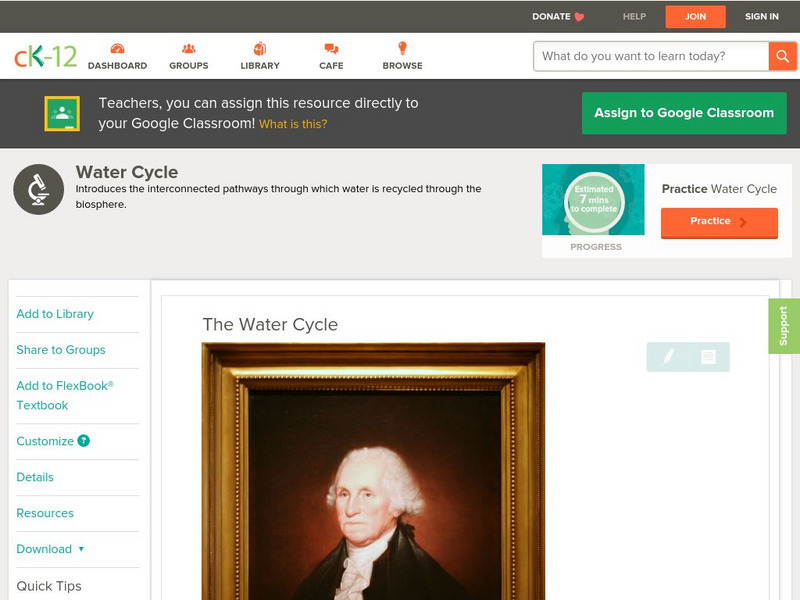Utah Education Network
Uen: Are You Dead or Alive?
A great site that offers real life examples of what makes something living or nonliving.
Utah Education Network
Uen: What's Different About These Worms?
Observe three different worm models and identify characteristics.
Utah Education Network
Uen: Making a Mini Worm Habitat
Activity shows the process of converting organic waste into usable fertilizer.
Georgia Department of Education
Ga Virtual Learning: Ap Biology: Ecology
Students review the study of living things and make connections back to Earth's systems. This unit focuses on how various species, grouped in populations and communities, work with the nonliving things around them to ensure survival.
CK-12 Foundation
Ck 12: Life Science: Water Cycle
[Free Registration/Login may be required to access all resource tools.] Water and elements like carbon and nitrogen are constantly being recycled through the environment. This process is called a biogeochemical cycle because it involves...
CPALMS
Florida State University Cpalms: Florida Students: Atoms Make Up Everything
Learn how atoms are the building blocks of all living and nonliving things.
Alabama Learning Exchange
Alex: From Weeds to Worms
The purpose of this lesson is to guide students in researching and discovering the importance of the interdependence of living and nonliving things in an ecosystem. Students utilize technology independently and cooperatively to establish...
Khan Academy
Khan Academy: Activity: Claim Testing What Is Life?
In this claim-testing exercise, you're going to make determinations about whether or not claims about living versus nonliving things are true or false.
CK-12 Foundation
Ck 12: Life Science: 12.10 Ecosystems
See how living and nonliving things exist together in an ecosystem.
Utah Education Network
Uen: Classify Yes, but Is It Alive?
Do you know the traits something that is alive? Test your knowledge of the traits of life by identifying objects as alive, not living, or once alive.
ClassFlow
Class Flow: Understanding Ecosystems
[Free Registration/Login Required] This flipchart will help students to learn about ecosystems and the living and nonliving things that interact in them.
PBS
Nh Pbs: Nature Works: Ecosystems
How would you define an ecosystem? Check out this educational resource to learn more about the living and nonliving parts of different ecosystems.
Other
Hub Pages: Abiotic Factors: A Component of Ecosystem
In the environment, there are external factors that really affect organisms living within it. One of these factors is the set of abiotic factors, or nonliving variables, such as wind, ocean, day length, rainfall, temperature, and ocean...
OpenSciEd
Open Sci Ed: 7.4 Matter Cycling & Photosynthesis
Where does food come from and where does it go next? This unit helps students figure out that they can trace all food back to plants, including processed and synthetic food. They obtain and communicate information to explain how matter...
University Corporation for Atmospheric Research
Ucar: Biogeochemical Cycles
The ways in which an element or compound such as water moves between its various living and nonliving forms and locations in the biosphere is called a biogeochemical cycle. All of the atoms that are building blocks of living things are a...
CK-12 Foundation
Ck 12: Life Science: Ecosystems
[Free Registration/Login may be required to access all resource tools.] Ecology is the study of ecosystems. That is, ecology is the study of how living organisms interact with each other and with the nonliving part of their environment....













